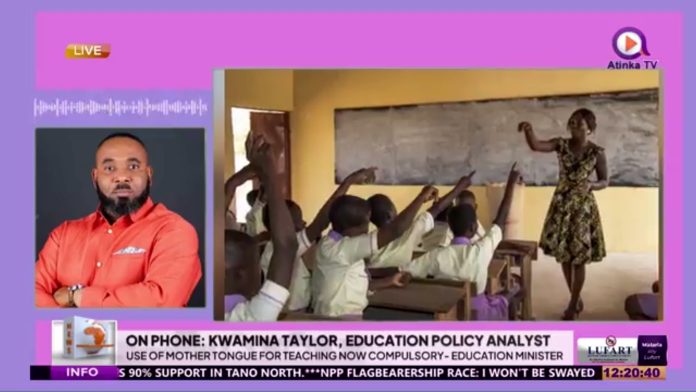Education Policy Analyst Kwamina Taylor has raised critical concerns about the practicality of implementing the Education Ministry’s new directive making local languages the compulsory medium of instruction in all basic schools across Ghana.
Speaking on Atinka TV’s Midday News with Ebenezer Madugu, Mr. Kwamina Taylor questioned how the policy would work effectively in multilingual classrooms.
“The question is, though this is a good policy, the implementation will be a challenge. Is it the teacher’s mother tongue or the pupil’s?” he asked.
Mr. Taylor acknowledged that research supports the idea that pupils taught in their mother tongue perform better in comprehension, describing the initiative as “a very good policy in general.” However, he cautioned that Ghana’s linguistic diversity, with over 80 major languages, could make uniform implementation difficult.
He explained that while the policy may work well in linguistically homogeneous areas such as Volta Region or Kumasi, it would pose major difficulties in cosmopolitan areas like Accra, where classrooms are made up of children from multiple ethnic backgrounds.
“In a school in Accra, we have Ewes, Asantes, Ga, and other tribes. Which of the languages should we use?” he queried.
Mr. Taylor further expressed concern about the long-term impact of the policy on Ghana’s efforts to prepare students for global competitiveness.
“We must think about positioning our children for the global market. I am not sure any of our local languages go beyond our borders, so if we make them the major mode of teaching, it could disadvantage our children in the future,” he cautioned.
He urged the Ministry of Education to consider a balanced approach that promotes literacy in local languages while maintaining strong proficiency in English, which remains the primary medium for higher education and international communication.
The education minister, Haruna Iddrisu, announced earlier that the use of local languages in teaching is now compulsory in all basic schools, explaining that the move aims to improve foundational learning outcomes across the country.
However, as education experts like Mr. Taylor point out, the success of the policy will depend largely on careful planning, teacher training, and sensitivity to Ghana’s complex linguistic landscape.
By Ebenezer Madugu






